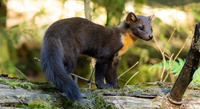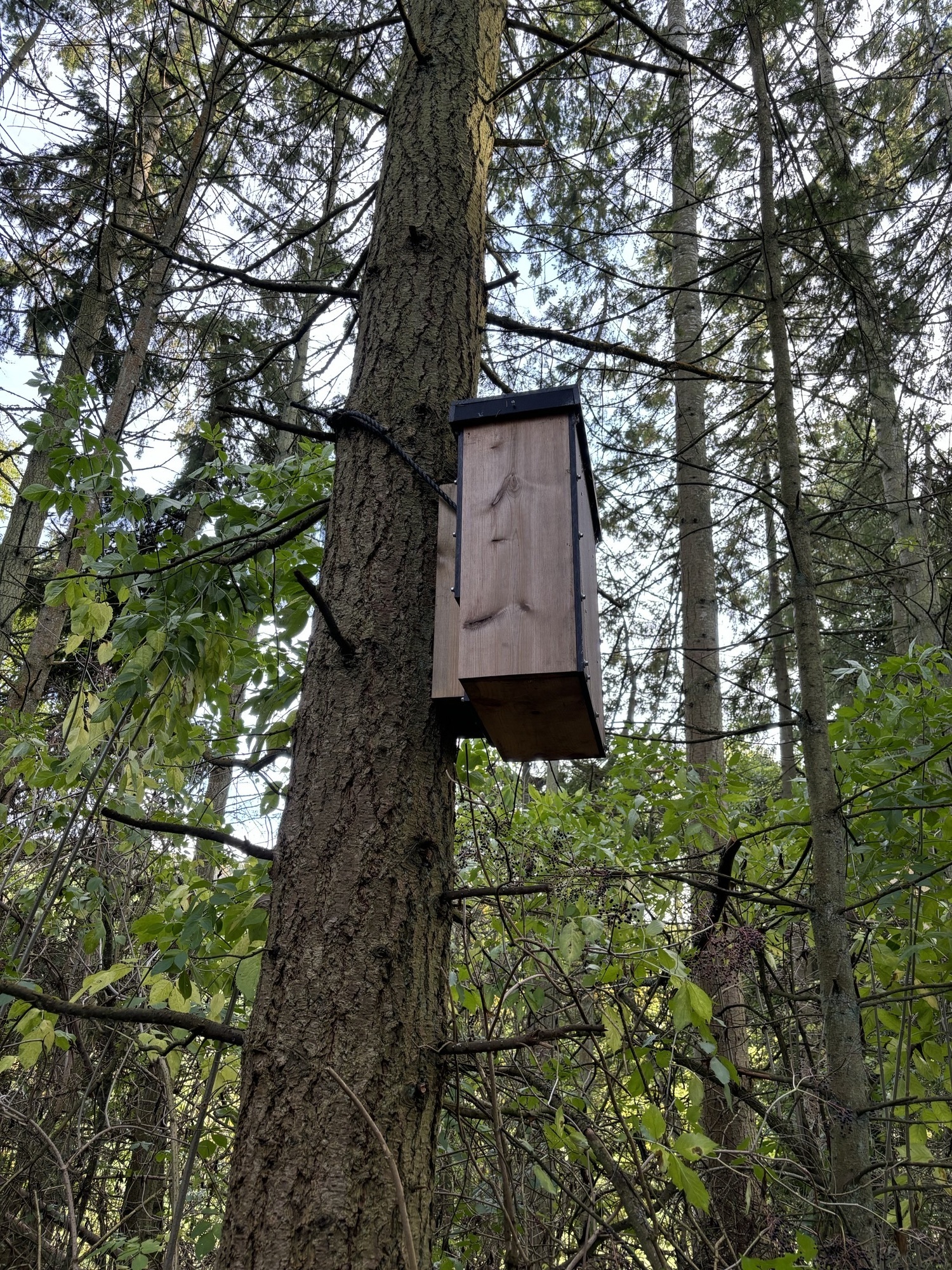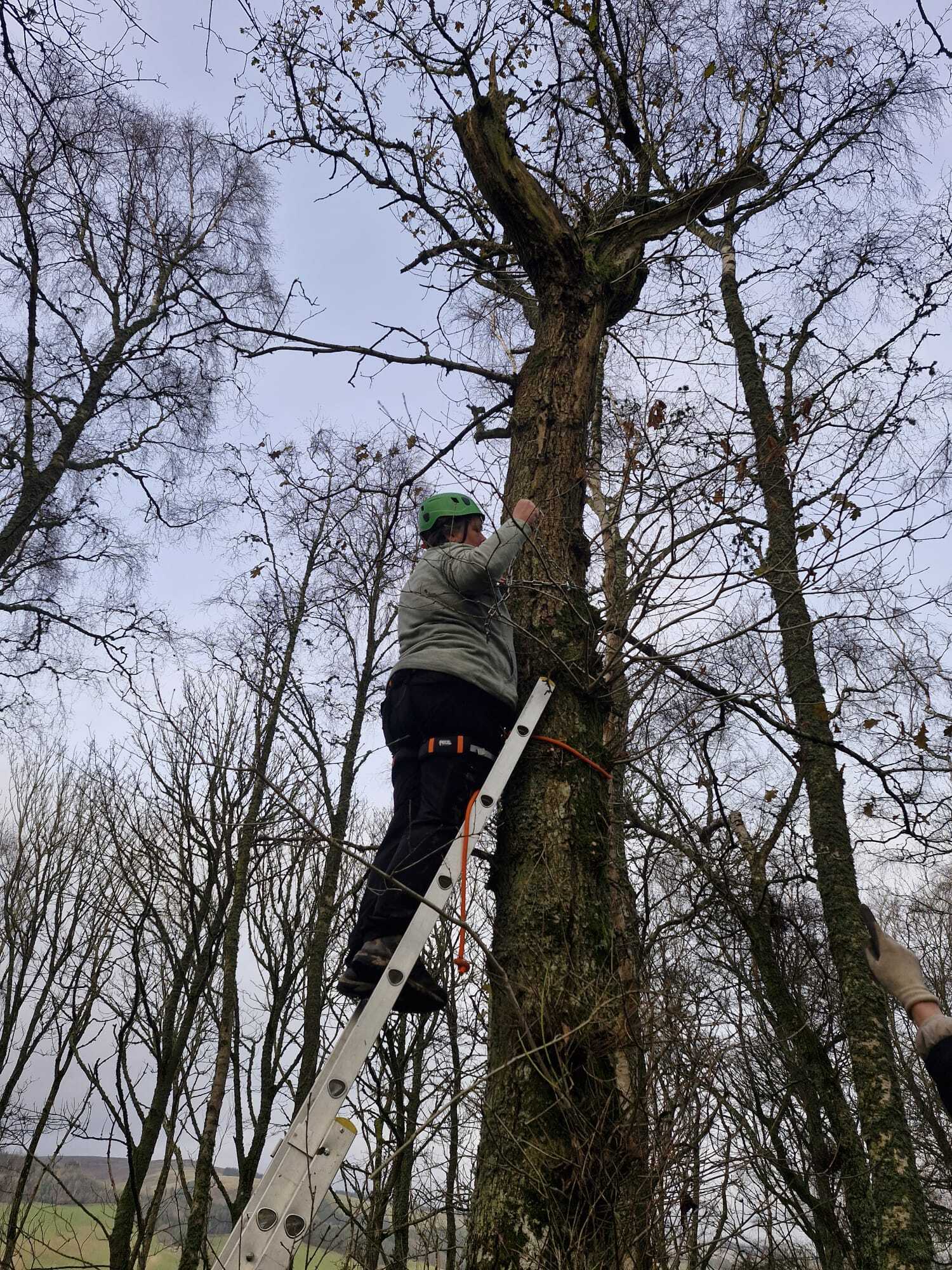Hosting den boxes for pine martens
Pine martens need large cavities in old (veteran) trees for denning, but these are often lacking in our woodlands. Den boxes can replicate this critical resource and provide a safe place for pine martens to rest, overwinter, give birth and raise their young — by hosting a den box, landowners can immediately improve their woodland habitat for pine martens.

During the development phase of VWT's Martens on the Move project, Dr Karen Blackport and her family were introduced to the project by Lisa McLeish, Biodiversity Officer at Bright Green Nature. Both Karen and Lisa are members of the local community which helped Vincent Wildlife Trust's (VWT) Martens on the Move project create the first phase of the Tweed Valley Monitoring Hub where ten den boxes were installed in 2023. The Blackport family is hosting two of these in woodland on their estate. Two years on, Karen shares her story of making space for nature and being a den box host.
Pine marten boxes at Faldonside estate

One of the den boxes at Faldonside.
Hosting pine marten boxes on our land was an exciting and rewarding step towards realising our vision for Faldonside Estate as a place where nature has been restored. Since we bought the 55-acre estate in late 2021, our family has been working to restore the historic parkland, walled garden and riparian woodlands along the majestic River Tweed — bringing them back to life for our family and for nature.
Gone are the chemically-treated lawns and bare fences and in their place, native wildflower meadows and hedgerows are flourishing. We’ve cleared the invasive rhododendron from the riverbanks and plan to introduce native-breed pigs to prevent sapling regrowth. Meanwhile, the old walled garden has been transformed with organic fruit and veg production, forest gardens and a wildlife pond breathing new life into the space. As a result, wildlife is returning — not just in abundance, but with greater diversity than we could have imagined.
Our first encounter with pine martens came in late 2022 when a trail camera, set up to monitor nocturnal wildlife, captured this elusive species feeding on our land. We were thrilled! Pine martens, once on the brink of extinction in Britain, were making a comeback and they had chosen Faldonside as part of their territory. Further research confirmed an increase in local sightings, and we were eager to support this resurgence. As vital native predators, their role in restoring ecosystem balance cannot be overstated. This inspired us to get involved in VWT’s Martens on the Move project by hosting den boxes on our estate — contributing to the conservation of not just the pine martens, but the entire ecosystem they help sustain.
Our involvement was spurred on by our friend and local wildlife expert, Lisa McLeish. Known across the region for her deep knowledge and passion for all things wild, Lisa knew we had observed martens on site and suggested we take part in the project. She also knew that pine martens had been spotted at nearby Abbotsford, and we were excited to make a tangible contribution to research on the local population.
Becoming a host for pine marten den boxes was much easier than I expected. VWT's team provided fantastic guidance — from assessing our land’s suitability to installing the boxes in two of our woodland areas. We didn’t require any special skills, just a willingness to get involved and offer the space.

Lisa McLeish helps to install pine marten den boxes as part of the Martens on the Move project
Lisa leads on the monitoring and we also plan to monitor the den boxes as a family, along with other members of our community. Lisa runs weekly nature clubs on the estate, so there’s no shortage of opportunities to participate in this exciting conservation work. Monitoring the boxes will help us track pine marten activity, which is crucial for understanding the effectiveness of the project. Even more exciting, is the ongoing effort to identify individual martens in the area, which brings a deeper level of engagement. Our two children, avid wildlife watchers, are particularly enthusiastic about getting involved in monitoring the boxes and contributing to the conservation efforts.
Beyond hosting den boxes, we’re committed to improving the habitat on Faldonside by planting native trees and shrubs to enhance natural cover, and leaving deadwood undisturbed for invertebrates, which pine martens can also feed on. Our land management approach prioritises and encourages natural processes, and we’re also reaching out to our neighbours to raise awareness. We encourage them to reduce chemical use and leave parts of their land undisturbed, creating a wider network of habitats where pine martens — and many other species — can thrive.
Watching Faldonside come alive with nature has been a deeply fulfilling journey, and hosting pine martens is just one piece of a much larger puzzle in our commitment to restoring the land for future generations.
Karen Blackport, pine marten den box host
Can you host a den box in one of four monitoring hubs?
Martens on the Move is installing den boxes in four key locations across Britain where pine marten populations are slowly expanding. If you own or manage woodland in the Brechfa, Shropshire-Herefordshire, Solway or Tweed Valley Monitoring Hub areas and would be interested in hosting a den box, please get in touch.